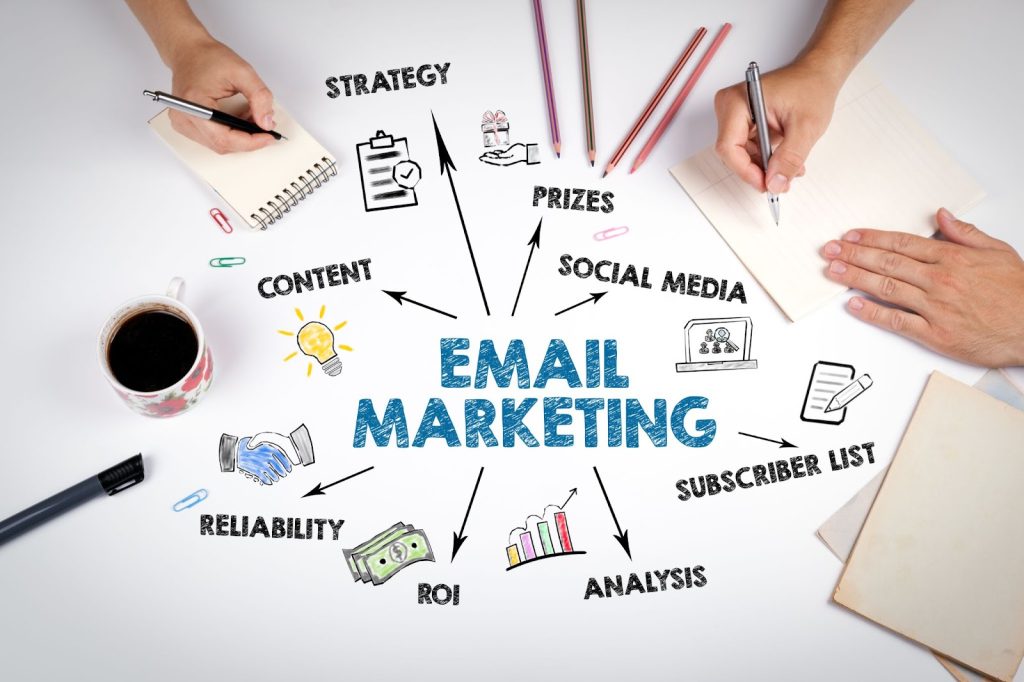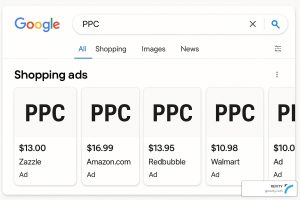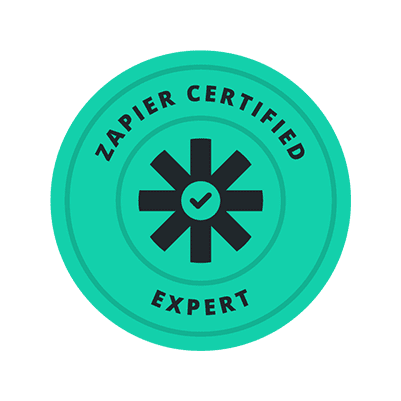In the fast-paced digital world, where online shopping is becoming the norm, marketing plays a crucial role in the success of ecommerce websites. With countless competitors vying for the attention of the same target audience, it’s essential to stand out and effectively reach potential customers. This is where strategic marketing comes into play.
Marketing is not just about promoting products or services; it’s about building brand awareness, fostering customer loyalty, and driving sales. For ecommerce businesses, an effective marketing strategy can make all the difference between thriving and merely surviving in the competitive online marketplace.
The primary goals of marketing for ecommerce websites are:
- Increasing Visibility: Effective marketing boosts your ecommerce website’s visibility on search engines and social media, making it more noticeable to your target audience.
- Generating Traffic: Well-planned marketing efforts attract a steady stream of visitors to your ecommerce website, increasing the potential customer base.
- Building Trust and Credibility: Marketing establishes your brand as trustworthy, reliable, and credible, leading to customer trust and recommendations.
- Boosting Conversions: Optimizing marketing channels and tailored content increases the conversion rate and turns prospects into loyal customers.
- Staying Ahead of Competitors: Marketing helps you identify trends, adapt strategies, and maintain a competitive edge amidst the ever-changing ecommerce landscape.
- Driving Repeat Business: A well-crafted marketing plan includes strategies for engaging existing customers, encouraging repeat purchases, and fostering long-term relationships.
The Struggles Ecommerce Businesses Face When It Comes to Marketing
While marketing is essential for the success of ecommerce businesses, it comes with its fair share of challenges. Understanding and overcoming these hurdles is crucial to developing a successful marketing strategy.
Let’s explore some of the common struggles ecommerce businesses face when it comes to marketing:
- Competition Frenzy: The digital marketplace is highly competitive, making it challenging for smaller businesses to gain visibility amid established brands with larger budgets.
- Customer Acquisition Cost: Acquiring new customers through paid channels can be expensive, requiring a delicate balance between cost and revenue.
- Changing Algorithms and Trends: Digital marketing is dynamic, with frequent changes in search engine and social media algorithms, demanding constant adaptability.
- Cart Abandonment: Convincing potential customers to complete their purchases and reduce cart abandonment is crucial for boosting conversion rates.
- Building Trust Online: Establishing credibility and security measures is essential to gain customer trust, particularly for lesser-known ecommerce businesses.
- Seasonal Fluctuations: Ecommerce sales experience seasonal highs and lows, requiring effective marketing campaigns to cater to changing demands.
- ROI Measurement: Measuring ROI for multiple marketing channels can be complex, necessitating thorough analysis and data interpretation.
- Shipping and Fulfillment: Timely and reliable shipping is vital for customer satisfaction, but logistics can be challenging, especially for international customers.
- Ad Blockers and Ad Fatigue: Overcoming ad blockers and ad fatigue to engage customers creatively is essential for effective marketing.
- Lack of Personalization: Providing personalized experiences with product recommendations and content is crucial for customer retention and repeat business.
While these challenges may seem formidable, they are not insurmountable. The key is to stay informed about industry trends, leverage data-driven insights, and be agile in adapting your strategies to address the ever-changing needs of your target audience.
As we delve deeper into the best marketing sources for your ecommerce website, remember that a comprehensive and well-balanced approach to marketing will yield the most significant results. By leveraging the power of various marketing channels, you can create a strong online presence, engage your target audience, and propel your ecommerce business to new heights of success.
Let’s explore these marketing sources in detail to help your ecommerce business thrive in the competitive online realm.
Search Engine Optimization (SEO)
Search Engine Optimization (SEO) is a digital marketing strategy focused on enhancing a website’s visibility in search engine results, such as Google, Bing, or Yahoo. For ecommerce websites, SEO is a fundamental aspect of driving organic traffic and attracting potential customers to your online store.
The Benefits of SEO for Ecommerce
- Increased Organic Traffic: SEO improves website visibility, leading to a steady flow of organic traffic from users searching for relevant products or services.
- Cost-Effectiveness: SEO is a long-term, cost-effective strategy compared to paid advertising, as it generates ongoing organic traffic without additional advertising costs.
- Credibility and Trust: Higher search engine rankings enhance brand credibility, building customer trust and increasing conversions.
- Targeted Traffic: SEO targets specific keywords, attracting highly relevant and interested users to your ecommerce website.
- Better User Experience: SEO practices improve overall user experience, including faster page loading times, user-friendly navigation, and high-quality content, leading to higher user satisfaction and engagement.
Key SEO Strategies for Ecommerce Websites
- Keyword Research and Optimization:
Conduct comprehensive keyword research to identify target audience search terms. Use both high-volume and long-tail keywords in product titles, descriptions, meta tags, and content to signal the website’s relevance to search engines.
- On-Page SEO Techniques:
Individually optimize product pages with descriptive titles, relevant meta descriptions, and well-structured URLs. Utilize appropriate alt text for product images and ensure logical website navigation and internal linking.
- Link Building and Backlink Strategies:
Earn high-quality backlinks from reputable websites through outreach to industry sites, bloggers, and influencers. Quality backlinks enhance your website’s authority and search rankings.
- Mobile Optimization:
Optimize your website for mobile devices with a responsive design, ensuring a seamless user experience across various screen sizes to improve search rankings and cater to mobile users.
Keep in mind that SEO is an ongoing process, and staying up-to-date with the latest best practices and algorithm changes will help you maintain a competitive edge in the ever-evolving digital landscape.
Pay-Per-Click (PPC) Advertising
Pay-Per-Click (PPC) advertising is a digital marketing model in which advertisers pay a fee each time a user clicks on their ad. This model allows ecommerce businesses to display ads on various platforms and search engines, reaching their target audience directly.
PPC plays a pivotal role in ecommerce marketing in the following ways:
- Instant Visibility:
PPC campaigns offer immediate results, displaying ads to users searching for relevant keywords or browsing related websites, instantly boosting online presence.
- Precise Targeting:
PPC platforms provide advanced targeting options, allowing tailored ads for specific demographics, interests, locations, and time of day to reach relevant potential customers.
- Flexible Budgeting:
With PPC, you control your budget, setting daily or monthly limits to avoid overspending. You only pay when someone clicks on your ad, making it cost-effective for driving ecommerce website traffic.
Popular PPC Platforms for Ecommerce Businesses
- Google Ads:
Google Ads is the leading PPC platform, displaying ads on Google’s SERPs and partner sites in the Display Network. Its vast reach and powerful targeting capabilities make it ideal for reaching a broad audience.
- Bing Ads:
Similar to Google Ads, Bing Ads targets users on Bing search engine and partner sites. It offers a cost-effective option with less competition for certain keywords, making it valuable for reaching Bing’s audience.
- Social Media Advertising (Facebook, Instagram, etc.):
Social media platforms like Facebook and Instagram provide robust advertising options with detailed targeting based on user demographics and interests. It is highly effective for showcasing visually appealing products to engaged audiences.
Tips for Effective PPC Campaigns in Ecommerce Marketing
1. Targeting the Right Keywords:
Thorough keyword research is essential for successful PPC campaigns. Focus on relevant keywords with high search volume and buying intent. Use tools like Google’s Keyword Planner or third-party keyword research tools to identify valuable keywords that align with your products.
2. Crafting Compelling Ad Copies:
Write ad copies that are engaging, clear and highlight the unique selling points of your products. Use strong calls-to-action (CTAs) to encourage users to click on your ads and visit your ecommerce website. Tailor ad copies to the specific target audience for each campaign to maximize relevance.
3. Setting and Monitoring Budgets:
Carefully set your daily or monthly budgets for each PPC campaign to control spending. Regularly monitor your campaigns’ performance and adjust bids and budgets as needed. Analyze key metrics like click-through rates (CTR), conversion rates, and return on ad spend (ROAS) to optimize your campaigns and achieve better results.
Remember to constantly test and refine your PPC strategies based on data-driven insights to stay ahead in the competitive ecommerce landscape.
Content Marketing
Content marketing is a powerful strategy that involves creating and distributing valuable, relevant, and engaging content to attract and retain a targeted audience. For ecommerce websites, content marketing plays a pivotal role in building brand awareness, establishing authority, and driving customer engagement.
Unlike traditional advertising, content marketing focuses on providing value to the audience, fostering trust, and nurturing long-term relationships.
The Benefits of Content Marketing for Ecommerce Websites
- Increased Brand Visibility:
Valuable content boosts online visibility, reaching a larger audience through sharing and social media.
- Enhanced Customer Engagement:
High-quality content keeps customers engaged and interested in the brand’s offerings.
- Authority and Credibility:
Expert content establishes the ecommerce website as a trustworthy source, fostering customer trust and loyalty.
- SEO Benefits:
Content marketing improves search engine rankings, attracting organic traffic and potential customers.
Types of Content that Resonate with Ecommerce Audiences:
- Product Descriptions and Reviews:
Well-crafted product descriptions and customer reviews build trust and highlight product benefits.
- Blogging and Articles:
Regularly updated blog content establishes the website as an industry thought leader, attracting organic traffic.
- Video Marketing and Tutorials:
Engaging video content showcases products and provides tutorials for informed purchasing decisions.
Leveraging Content for SEO and Social Media Promotion:
When creating content, incorporate relevant keywords to optimize it for search engines. High-quality and keyword-rich content improves the website’s search engine ranking, driving organic traffic to the ecommerce site. Additionally, having valuable content increases the likelihood of other websites linking to it, further boosting SEO efforts.
Share your content on social media platforms to reach a broader audience. Engaging and shareable content can go viral, exposing the brand to a wider demographic. Encourage social media followers to share your content, expanding its reach and driving traffic to the ecommerce website.
Providing valuable and informative content establishes the website as a go-to resource for customers, encouraging repeat visits and increasing the chances of converting visitors into loyal, satisfied customers.
Email Marketing
Email marketing remains an indispensable tool for driving ecommerce success. It provides a direct line of communication with your audience, allowing you to nurture relationships, promote products, and drive sales. For ecommerce businesses, email marketing offers a host of benefits that contribute to increased customer engagement, retention, and revenue generation.

The Importance of Email Marketing for Ecommerce:
- Personalized Communication:
Email allows personalized messages based on preferences, purchase history, and behavior, enhancing the customer experience.
- Higher ROI:
Email marketing offers one of the highest ROI among digital channels, driving revenue growth with minimal costs.
- Customer Retention and Loyalty:
Engaging emails foster loyalty and encourage repeat purchases, keeping the brand top-of-mind.
- Recovery of Abandoned Carts:
Cart abandonment recovery emails remind customers to complete transactions, addressing a common ecommerce challenge.
Building a Strong Email Subscriber List
Building a robust email subscriber list is essential for a successful email marketing strategy. Here are some effective ways to grow your email list:
- Website Opt-In Forms:
Strategically place subscription forms on your website with incentives to encourage visitors to subscribe.
- Content Upgrades:
Offer valuable content as incentives for email sign-ups, such as eBooks or exclusive product sneak peeks.
- Social Media Promotion:
Promote your email newsletter on social media to attract new subscribers.
- Contests and Giveaways:
Organize contests or giveaways that require email sign-ups to entice participants to join.
Best Practices for Crafting Effective Ecommerce Emails
- Promotional Offers and Discounts:
Use email to showcase exclusive promotions, discounts, and limited-time offers with eye-catching visuals and compelling copy to drive immediate action.
- Cart Abandonment Recovery Emails:
Send personalized emails to remind customers about unfinished purchases, offering incentives to encourage completion.
- Product Recommendations and Upselling:
Customer data is used to send relevant product recommendations and upsell emails, suggesting complementary products or bundles to increase order value.
Ecommerce businesses can establish meaningful connections with their customers, drive repeat purchases, and boost overall revenue by employing effective email marketing strategies. The key is providing valuable, personalized content that resonates with the audience, driving engagement, and building long-lasting relationships.
Social Media Marketing
Social media marketing is an indispensable component of any successful ecommerce strategy. With billions of active users on various platforms, social media offers a vast audience to engage with and promote your products. Leveraging social media effectively allows ecommerce businesses to increase brand awareness, foster customer loyalty, and drive website traffic.
The Benefits of Social Media Marketing for Ecommerce:
- Increased Brand Visibility:
A strong social media presence reaches a wider audience, exposing your products to potential customers.
- Direct Customer Engagement:
Social media enables direct communication, fostering customer relationships and loyalty.
- Product Showcasing:
Visually showcase products through high-quality images, videos, and interactive content.
- Social Proof and Recommendations:
Positive reviews and user-generated content build trust and encourage product consideration.
Identifying the Most Suitable Social Channels for Ecommerce Businesses
Not all social media platforms are created equal, and each has its unique user base and content formats. Identifying the most suitable platforms for your ecommerce business ensures that you reach the right audience with the most engaging content.
- Facebook:
Broad demographic reach for showcasing products and engaging customers through posts, ads, and Messenger.
- Instagram:
Ideal for visually appealing products, use Stories, Reels, and shoppable posts for an immersive shopping experience.
- Pinterest:
Excellent for fashion, home decor, and DIY products, as users actively search for inspiration and ideas.
- Twitter:
Engage with customers in real-time, addressing inquiries, and sharing updates and promotions.
Creating Engaging Social Media Content
Engaging content is essential to captivate your social media audience and foster meaningful interactions. Consider these content ideas:
- Visual Storytelling: Use images and videos to tell stories about your brand, products, and customers. Share behind-the-scenes content and user-generated posts to humanize your brand.
- Educational Content: Offer valuable tips, tutorials, and guides related to your products or industry. Position your brand as an authority and resource for customers.
- Interactive Content: Polls, quizzes, and interactive posts encourage active participation and boost engagement with your audience.
- User-Generated Content (UGC): Encourage customers to share their experiences with your products and reshare UGC to showcase real-life use cases.

Running Social Media Contests and Giveaways
Contests and giveaways are powerful tools to generate excitement and increase brand visibility on social media.
- Set Clear Goals: Define the objectives of your contest or giveaway, whether it’s to increase followers, drive traffic to your website, or encourage user-generated content.
- Choose Prizes Strategically: Offer prizes that align with your brand and will appeal to your target audience. The prize should encourage participation and engagement.
- Create Simple Entry Rules: Keep entry rules straightforward to encourage more participants. Common methods include liking, sharing, or commenting on the contest post.
- Promote Across Platforms: Use multiple social media channels to promote your contest or giveaway and reach a broader audience.
Tailoring content to the platform’s unique features and your audience’s preferences will help you create meaningful connections and turn social media followers into loyal customers.
Analytics and Data Tracking
In the world of ecommerce, data-driven marketing decisions play a pivotal role in achieving success. Data analytics provides valuable insights into customer behavior, preferences, and interactions with your ecommerce website and marketing efforts.
Armed with this information, ecommerce businesses can make informed decisions, fine-tune their strategies, and optimize their overall marketing performance.
The Importance of Data-Driven Marketing for Ecommerce:
Understanding Customer Behavior: Data analytics helps you understand how customers interact with your website, which products they prefer, and what influences their purchasing decisions. These insights enable you to tailor your marketing efforts to meet their needs and expectations.
- Identifying Key Performance Indicators (KPIs): By tracking relevant KPIs, such as conversion rates, click-through rates, and customer acquisition costs, you can measure the success of your marketing campaigns. Data-driven analysis empowers you to focus on the strategies that deliver the best results.
- Personalization and Segmentation: Data-driven marketing enables you to segment your audience based on their preferences and behaviors. This allows you to create personalized experiences, targeted promotions, and content that resonates with specific customer segments.
- Optimizing Return on Investment (ROI): Analyzing data helps identify which marketing channels and campaigns generate the highest ROI. Allocating your budget effectively based on data insights ensures you get the most value from your marketing expenditures.
Tools for Tracking and Analyzing Ecommerce Marketing Efforts
To harness the power of data, ecommerce businesses need robust analytics tools that track and analyze various marketing metrics. Some essential tools include:
- Google Analytics: A comprehensive web analytics tool that provides valuable data on website traffic, user behavior, and conversion rates. It helps you track the effectiveness of your marketing campaigns and measure various performance metrics.
- Email Marketing Analytics: Most email marketing platforms offer analytics that tracks email open rates, click-through rates, and conversion rates. These insights help you assess the success of your email campaigns and refine your email marketing strategy.
- Social Media Analytics: Social media platforms, such as Facebook Insights, Twitter Analytics, and Instagram Insights, provide data on post engagement, audience demographics, and reach. These metrics help you optimize your social media content and target the right audience.
- Ecommerce Platform Analytics: If you use an ecommerce platform like Shopify or WooCommerce, they offer built-in analytics to track sales, customer behavior, and product performance.
Using Data to Optimize Marketing Strategies
Data-driven decision-making requires a systematic approach to analyzing data and applying insights to optimize marketing strategies.
- Regular Data Analysis: Regularly review data from your analytics tools to identify trends, patterns, and opportunities. Continuously monitor KPIs and metrics to detect any deviations from expected performance.
- A/B Testing: Conduct A/B tests to compare the performance of different marketing elements, such as ad copy, visuals, or landing pages. A/B testing allows you to refine your marketing strategies based on concrete data and insights.
- Customer Journey Mapping: Use data to map out the customer journey and identify potential areas for improvement. Analyze where customers drop off in the sales funnel and implement strategies to minimize cart abandonment and increase conversions.
- Iterative Optimization: Marketing strategies should be iterative and adaptive based on data insights. Continuously optimize your campaigns, targeting, and content to align with changing customer preferences and market dynamics.
Data-driven marketing decisions are integral to achieving ecommerce success. Making informed decisions based on data ensures that your ecommerce brand stays competitive and relevant in an ever-evolving digital landscape.

Now that you have a deeper understanding of the essential marketing sources for ecommerce success, it’s time to take action. Start by auditing your current marketing efforts to identify areas that need improvement. Set clear goals and objectives for each marketing strategy and align them with your overall business objectives.
Remember that marketing is an iterative process, and continuous monitoring and analysis are essential to adapt to changing market trends and customer preferences. Regularly review performance metrics and KPIs to gauge the effectiveness of your marketing efforts. Implement A/B testing and optimization strategies to fine-tune your campaigns for better results.
Additionally, prioritize customer satisfaction and engagement throughout your marketing initiatives. By putting the customer at the center of your marketing strategy, you can build lasting relationships, foster brand loyalty, and create a strong foundation for growth.
Revolutionize Your eCommerce Site with Revity!
Is your eCommerce site not living up to its potential? Don’t worry; Revity is here to transform your online business and drive exceptional results! Our team of experts specializes in optimizing eCommerce websites for mobile users, ensuring that your site stays ahead of the competition.
Why Choose Revity?
At Revity, we pride ourselves on cutting-edge strategies and in-depth knowledge of eCommerce and optimization. We know exactly what it takes to take your online business to new heights. Whether you’re a newcomer to mobile eCommerce or looking to enhance your existing mobile presence, we have tailored solutions just for you.
Seamless User Experiences and Increased Conversions
With our expert guidance, you’ll have a mobile-friendly website that delivers seamless user experiences across all devices. No more potential customers bouncing off your site due to a frustrating mobile experience! Our optimization techniques are proven to increase conversions and maximize your business potential.
Don’t Wait; Take Action Now!
Your competitors are not waiting, and neither should you. Now is the time to take action and stay ahead in the fast-paced world of mobile eCommerce.
Contact us today through our online form or at 801-877-0608 to learn how Revity can optimize your site for both mobile and desktop users, helping you achieve your business goals like never before. Let’s revolutionize your mobile eCommerce site together!
































